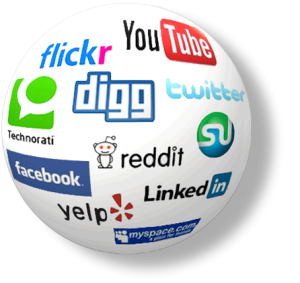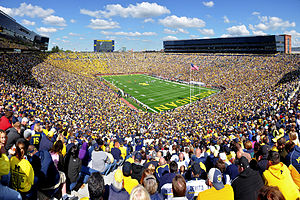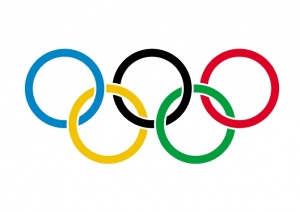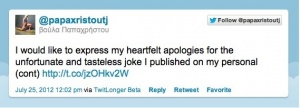Social Media in Sports
Social media in sports is the use of "interactive platforms via which individuals and communities create and share user-generated content” in the world of athletics[1]. Social media has allowed for much more direct contact between athletes, teams and fans. According to ESPN's Colin Cowherd, fifty-five percent of Twitter users use the social media platform to read and write about sports[2]. There are numerous different sites on which people can share information from user-to-user, including, but not limited to, Facebook, Twitter, Instagram, Google+, and Flickr among many others.
Part of the reason for the increased use of social media is the constant activity. According to Facebook, there are over 1 billion active users (at least once a month) on their site, and that number continues to grow[3]. Twitter is available in more than 20 different languages[4].
The National Basketball Association (NBA) claims that between its players, teams and the league itself, it has nearly 300 million fans or followers on Facebook and Twitter alone[5]. According to the Major League Baseball (MLB) Public Relations official Twitter account, during game one of the 2012 World Series, 20% of all comments made via social media were about San Francisco Giants third baseman Pablo Sandoval, who hit three home runs[6]. The Facebook page for the University of Michigan's football team has almost one million fans and the team's Twitter page has well over 100,000 followers. In just a matter of weeks, Great Britain long jumper Greg Rutherford went from around 5,000 followers on Twitter to well over 100,000 after winning the gold medal in the 2012 Olympics[7]. Portugal soccer star Cristiano Ronaldo currently has the most Twitter followers of any athlete, having accumulated well over 13 million. According to one survey, over half of current college football coaches are on Twitter[8]. Following the announcement that Tampa Bay Ray's pitcher David Price had won the Cy Young Award, he reported that he had nearly 1,000 mentions on Twitter within 20 minutes[9]. Due to the massive amount of use in the public sphere, there are many ethical implications related to the use of social media in sports.
Contents
College Sports
Social media has become a huge part of college sports recruiting. This has become a very controversial area, due to the many NCAA rules and regulations regarding limits on contact with recruits. Compliance has always been an issue for major NCAA programs, mainly because of the lack of awareness.
As a result of recent developments, many colleges, such as Clemson, Florida State, North Carolina, Iowa, Kansas and Boise State, have outlawed the use of social media on the sidelines by their players. Many schools have divisions of their athletic departments, often labeled 'Public and Media Relations,' that are tasked with monitoring the use of social media by the school's athletes. The University of Michigan distributes social media guidelines to all of its athletic teams and asks every athlete to sign a social media use agreement[10].
Nowadays nearly all teams have their own hashtags. These hashtags, which are "short messages on microblogging social networking services" are oftentimes advertised around stadiums, on the field or on television[11].
Communication
Social media offers a medium for the world's most popular athletes and teams to communicate with fans. Many athletes have taken to the Internet to announce big decisions, or teams take the opportunity to publicize new acquisitions or post lineups. Many teams even have play-by-play accounts set up, meaning that a fan can now follow the game solely by reading text, or even picture updates online. Many also hold various contests or polls through automated programs.
Former Rutgers football player Eric LeGrand, who was paralyzed from the neck down in an on-the-field accident, uses his Twitter account to update fans on his progress as he attempts to re-learn how to walk[12].
Many high school athletes take to social media to promote their highlight tape or to contact recruiters in order to gauge possible interest.
Ethical Implications
Controversy
Many athletes have gotten fined and even suspended for messages relayed via social media. Some of the most notable instances have revolved around international soccer players such as English internationals Rio Ferdinand, Ashley Cole and Jack Wilshere. Ferdinand became the first to be fined for a retweet, which is the re-posting of another user's tweet on Twitter[13]. Following the killing of Osama bin Laden, Pittsburgh Steelers running back Rashard Mendenhall infamously tweeted, "For those of you who said you want to see Bin Laden burn in hell and piss on his ashes, I ask how would God feel about your heart?"[14] In regards to the drama that has come from the NHL lockout, Dave Bolland, a center for the Chicago Blackhawks retweeted a post calling for commissioner Gary Bettman's death. [15]
Recently, following a very heated and controversial Manchester derby between rival soccer clubs Manchester United and Manchester City. There were coins thrown at players and fans running onto the pitch. Following the game, it was reported that a 15-year-old boy was arrested for a racist tweet toward United defender Ferdinand.[16]
Michigan Athletics and Twitter
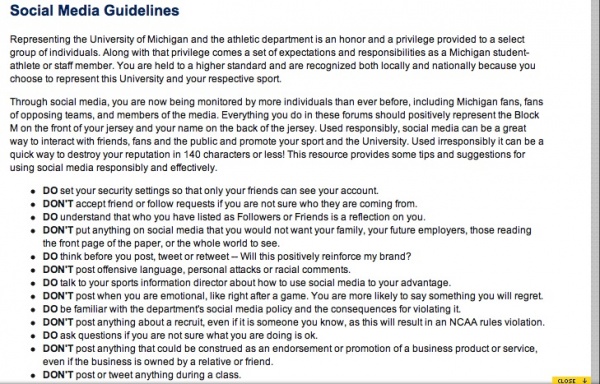
Recently, student-athletes at the University of Michigan have had to sign a social media policy so that controversies do not result and reflect poorly on the University as a whole. As Kellie Woodhouse writes in an article for Ann Arbor.com, "The policy is straightforward, advising students not to post when they're emotional, not to use offensive language or slurs and not to tweet during class. If athletes violate the policy they can be reprimanded or, worse, face suspension." [17] There are a number of different ways that college student-athletes can get in trouble by actively using social media websites such as Twitter. Perhaps the easiest social media rule to break is college players communicating with their high school teammates or high school players from other towns when these high school players are getting recruited by college athletic programs. Woodhouse explains that there is an "NCAA bylaw that prohibits players form publicly contacting unsigned recruits." [18] When Michigan wide receiver Roy Roundtree found out that his high school teammate Mike McCray committed to Michigan, he tweeted, ""S/O [Shout out] to my lil brotha Mike McCray @MJM92013 for committing to Michigan today." [18] To many people, this would seem like a nice gesture from an old high school teammate that was not breaking any rules, yet since Roundtree contacted McCray before McCray had officially committed to Michigan by signing his letter of intent, Roundtree was breaking an NCAA rule and led the University of Michigan to receive "secondary NCAA violations."[18]
Twitter and the Olympics
Before the start of the 2012 Olympic Games in London, triple-jumper Voula Papachristou was suspended from Greece's Olympic Team for a racist message that she posted on her Twitter page[19]. Papahristou tweeted, "With so many Africans in Greece, at least the mosquitoes of West Nile will eat homemade food." [20] The tweet was in reference to African immigrants living in Greece, and, as Papahristou later commented, was meant as a "joke." [20] The message was "retweeted over 100 times" and "immediately [drew] angry reactions" from followers and others who viewed Papahristou's Twitter page. Papahristou later apologized for her "unfortunate and tasteless joke." [20]
“I would like to express my heartfelt apologies for the unfortunate and tasteless joke I published on my personal Twitter account...I am very sorry and ashamed for the negative responses I triggered, since I never wanted to offend anyone, or to encroach human rights.” --Voula Papachristou
Impersonation
Many social media accounts attempt to impersonate athletes. Different platforms have different ways of verifying athletes once they achieve a certain level of popularity. This is in order to prevent fake accounts from surfacing. There have also been many issues with athletes' accounts being hacked.
University of Michigan quarterback Denard Robinson's Twitter account was recently compromised[21]. Following the incident, Robinson deleted his account (before eventually re-instating it). Many other athletes must deal with the constant pestering of fans and must be careful not to allow others access to their account information.
Sometimes Twitter users create fake accounts for athletes or other celebrities and use these accounts to sarcastically mock, defame, and slander these athletes in order to generate laughs from their followers. Anyone can make a Twitter page, and the easy access and anonymity of Twitter affords users the opportunity to create any online persona that they desire, even if the online persona does not represent the user's true identity in the real world. For example, the Twitter account Tom Tebow, also known by his tagline IamEvilTebow, is a fake account meant to mock NFL quarterback Tim Tebow[22]. Tim Tebow has become famous both for his ability to win on the football field and his religious and philanthropic work off the football field, and the "Evil Tebow" Twitter page is used to mock Tim's accomplishments and religious beliefs. The Evil Tebow header describes himself as "the Evil Brother of Tim. I throw right handed, frequent strip clubs, [and do not] even go to church on Easter." Evil Tebow has 28,214 followers and thus is able to reach a large following with his tweets[22]. The use of fake Twitter accounts and other mocking accounts brings up the ethics of Twitter's user policy, and the idea that people can create accounts without using their real names in order to slander others in the community.
See Also
- Privacy in Social Networking
- Student-Athlete Social Media Monitoring
- Privacy
- YouTube
References
- ↑ Wikipedia, Social media
- ↑ Twitter, Colin Cowher's Twitter
- ↑ Facebook Newsroom, Facebook user count article
- ↑ Twitter, About Page
- ↑ Twitter, Darren Rovell's Twitter
- ↑ Twitter, MLB PR's Twitter
- ↑ Bleacher Report, Sports Stars on Twitter: Marketing Geniuses or Massive Twits?
- ↑ Coaching Search, Survey of college football coaches on social media use
- ↑ Twitter, Tamba Bay Times Twitter
- ↑ http://www.annarbor.com/news/as-twitter-incidents-multiply-michigan-athletes-sign-social-media-contract-and-try-to-avoid-controve/
- ↑ Wikipedia, Hashtag
- ↑ Twitter, Eric LeGrand's Twitter
- ↑ Rant Sports, Manchester United Defender Rio Ferdinand Fined For Retweeting Racial Comment About Ashley Cole
- ↑ Twitter, Rashard Mendenhall's Twitter
- ↑ ESPN, [1]
- ↑ Teenager arrested for racist tweet http://sports.ndtv.com/football/news/item/200561-teenager-arrested-for-racist-tweet-to-manchester-united-player
- ↑ http://www.annarbor.com/news/as-twitter-incidents-multiply-michigan-athletes-sign-social-media-contract-and-try-to-avoid-controve/
- ↑ 18.0 18.1 18.2 http://www.annarbor.com/news/as-twitter-incidents-multiply-michigan-athletes-sign-social-media-contract-and-try-to-avoid-controve/
- ↑ NY Times, Twitter Comment Costs Greek Athlete Spot in Olympics
- ↑ 20.0 20.1 20.2 http://www.nytimes.com/2012/07/26/sports/olympics/twitter-comment-costs-greek-athlete-spot-in-olympics.html?_r=0
- ↑ Huffington Post, Denard Robinson Twitter Hacked By Ex-Girlfriend?
- ↑ 22.0 22.1 Twitter, Evil Tebow Twitter
| ←Back • ↑Top of Page |
